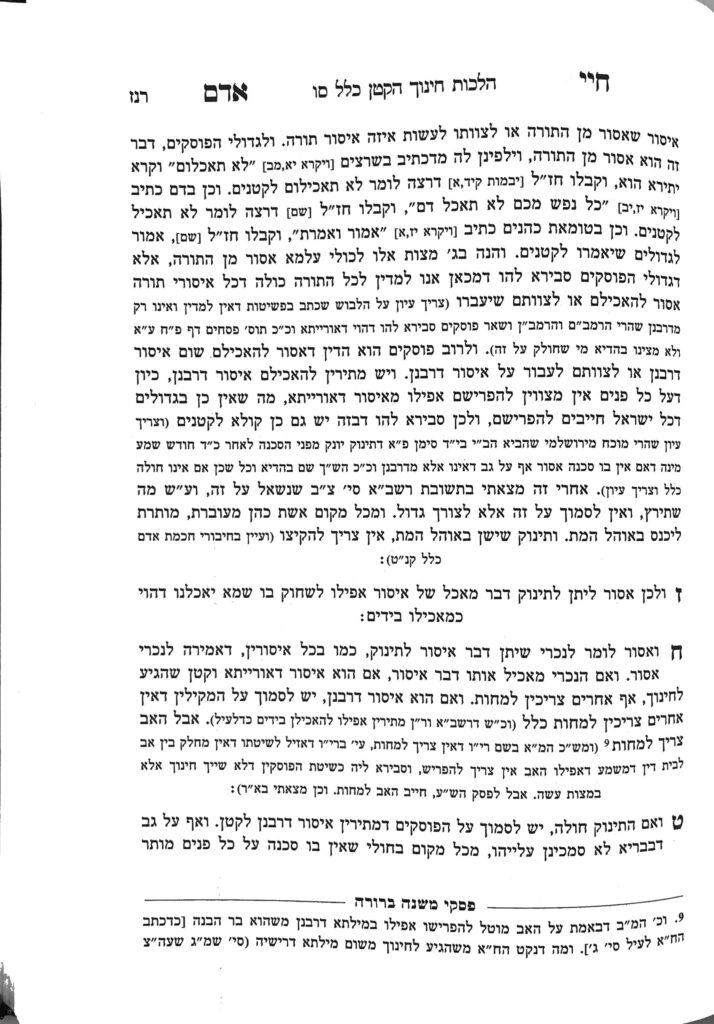We are continuing in siman 6. We left off with the opinion of the Rashba, which permits an adult to perform sefiya b’yadayim on an issur derabanan. The Biur Halacha, at the end of siman 243, brings this opinion. He writes that Rav Akiva Eiger was asked if people who lived in cities without an eruv could give a siddur to a katan to carry on streets which were a karmelis, where the issur to carry is only derabanan. Rav Akiva Eiger answered that it is assur, because the heter of sefiya b’yadayim to a child only applies for the needs of the child, and not for the child to do something for the adult (as we learned in shiur 1291). However, Rav Akiva Eiger concludes that if the child needs the siddur for their own davening, an adult could give the child the siddur, and once the siddur is at shul, the adult could use it as well. It appears that Rav Akiva Eiger is following the opinion of the Rashba, that an adult can perform sefiya b’yadayim on a child for an issur derabanan, when the sefiya is for the benefit of the child. However, in siman 362, where the Mishnah Berurah discusses carrying, he does not quote the Rashba, so his opinion on the matter is not clear.
The Chiddushei HaRim and Shulchan Aruch HaRav accept the opinion of the Rashba.
We learned about the three sources in the Torah regarding sefiya b’yadayim on a katan. Rashi brings a fourth source from the Mechilta, which the Gemara and poskim do not quote. The pasuk says lo saaseh melacha, atah u’vincha u’vitecha, which the Mechilta understands as a chiyuv on adults to ensure that katanim are not mechalel Shabbos. We need to understand why the Gemara does not bring this pasuk, and whether we pasken in accordance with this Mechilta over the Gemara.
The Sefer Imrei Binah points out that regarding Shabbos, one must perform a meleches machsheves in order to transgress Shabbos (on a Torah level). This means that one must have a level of intent when doing a melacha in order to transgress it. Since a child is lacking that awareness, we would not have learned from the other sources that there is an issur of sefiya b’yadayim to direct a child to do melacha on Shabbos, because the chilul shabbos would not be deoraysa. Thus, the Mechilta teaches us that even though the child cannot perform a meleches machsheves, it is still an issur deoraysa to perform sefiya b’yadayim on a child regarding issurei shabbos.
The Gemara does not mention this fourth pasuk, which would lead us to conclude that the Gemara does not understand that the actions of a child which lack meleches machsheves are assur mideoaysa. We will discuss this question further in the next shiur, be’ezras Hashem.
Summary
The Chayei Adam understands that sefiya b’yadayim to a katan on anything assur mideoraysa, or to tell a child to do any action which is assur mideoraysa, is an issur deoraysa.
Sefiya b’yadayim on anything assur miderabanan is assur as well, but there is an opinion one may rely on (the Rashba) under compelling circumstances to perform sefiya b’yadayim. Either way, it may only be relied upon for the child’s benefit, not for a child to benefit an adult.



